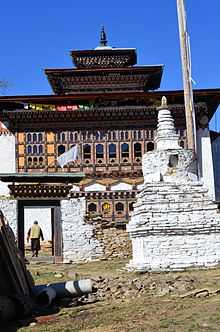Sobrang Monastery
| Sobrang Monastery | |
|---|---|
 Sobrang Monastery | |
 Sobrang Monastery Location within Bhutan | |
| Coordinates: | 27°29′32.25″N 90°55′7.32″E / 27.4922917°N 90.9187000°ECoordinates: 27°29′32.25″N 90°55′7.32″E / 27.4922917°N 90.9187000°E |
| Monastery information | |
| Location | Bhutan |
| Founded by | Gyelwa Lhanangpa (1164-1224) or Nyoetoen Trushig Choeje (1179-1265) |
| Founded | c. 1230 |
| Date renovated | Early 20th century and 2000 |
| Type | Tibetan Buddhist |
| Lineage | Nyingma |
| Festivals | Kangso |
Sobrang Monastery is a Buddhist monastery in Ura Gewog, Bhutan. It is one of the most important Bhutanese monasteries as descendants from its lineage include Pema Lingpa and hence the Wangchuck Royal family.[1]
It was founded c. 1230 either by Gyelwa Lhanangpa (1164-1224) or Nyoetoen Trushig Choeje (1179-1265); traditions and texts differ.[1]
It was restored in the early 20th century and again in 2000.[1]
Lineage holder
The lineage holder is called the Sombrang Choeje.[1]
Festivals
The Sombrang Choeje's family perform the Kangso ritual each year in the 9th or 10 Bhutanese month. This involves religious dances and provides a purification and blessing for the family and the community.[1][2][3]
Relics
These include:[1]
- Three stone pillars, two in the courtyard and one inside the building. They are solid megaliths lacking inscriptions and dating to prehistoric times.
- Several thick bamboos resembling vajra, believed to have been given by Gyelwa Lhanangpa to his son after opening sacred sites at Tsari Mountain.
- A small drum called "the roar of the thunder"; the sound of which gave the monastery its name.
- A statue of the founder, Nyoetoen Trushig Choeje.
References
- ↑ 1.0 1.1 1.2 1.3 1.4 1.5 Bhutan Cultural Atlas. "Sombrang Lhakhang". UNESCO. Retrieved 24 February 2015.
- ↑ "Visit Bhutan 2015 – Sumthrang Kangsoel". Visit Bhutan 2015.
- ↑ "Sumthrang revives its mask dances". KuenselOnline.
External links
| Wikimedia Commons has media related to Sombrang Lhakhang. |